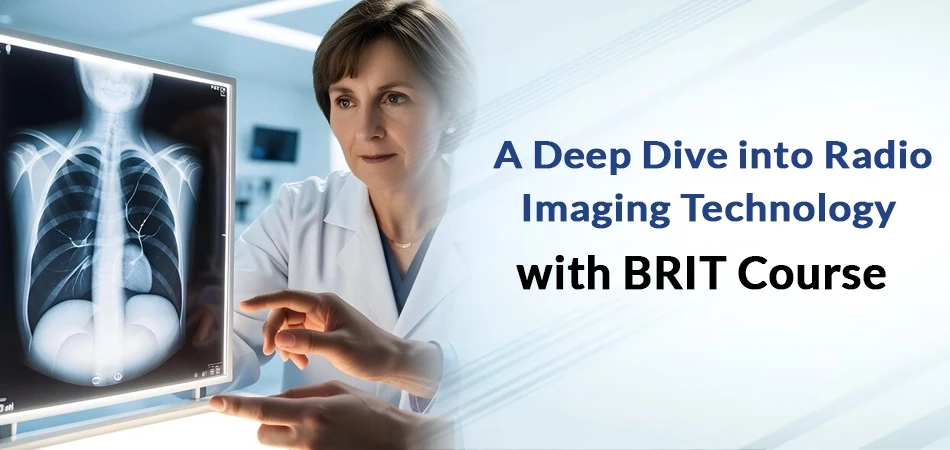A Deep Dive into Radio Imaging Technology with BRIT Course

In the ever-evolving healthcare sector, the radio imaging technology program pioneers in diagnostic progress. As the emphasis on data and patients in healthcare grows, the demand for skilled experts in this field has risen significantly. Obtaining a Bachelor's degree in Radio Imaging Technology equips students with essential technical expertise and prepares them to significantly impact the future of healthcare. In this blog entry, we will explore the significance of this degree, its curriculum, and the possible career opportunities it provides.
What is Radio Imaging Technology?
Radio imaging technology includes several diagnostic imaging methods that employ radiation to generate detailed pictures of the body. This encompasses techniques like X-rays, MRI (Magnetic Resonance Imaging), CT (Computed Tomography), and ultrasound. These imaging methods are essential for identifying medical issues, directing treatment strategies, and tracking patient development.
Eligibility:
- To be admitted to his class, you need to have completed your 10+2 in a science field and achieved an Aggregate of 55% marks.
- The eligibility requirements can differ among universities and institutions since they administer entrance exams that you need to study for to enrol in the BRIT course.
What is the syllabus for the BRIT Course?
First Year B.Sc. Radio Imaging Technology Course
1. Gross Radiological & Surface Anatomy of the Human Body
2. Physiology & Pathology of Human Body Systems
3. Radiographic Techniques & Dark Room Procedures
4. Basic Radiation Physics & Principles of Radiotherapy
Second Year B.Sc. Radio Imaging Technology Course
1. Modern Imaging & Recent Advances
2. Apparatus of Imaging, Radiotherapy & Quality Assurance
3. Physics Of Radiotherapy
4. Radiation Protection & Monitoring
Third Year B.Sc. Radio Imaging Technology Course
1. Special Radiological Procedures & Contrast Media
2. Special operations of different body organs
3. Radiotherapy planning & Techniques
4. Radiation Dosimetry- Principles & Applications
5. Hospital Practice & Care of Patient
What is the Importance of a Bachelor’s Degree in Radio Imaging Technology?
1. Comprehensive Skill Development
A Bachelor’s in Radio Imaging Technology provides a well-rounded education that combines theoretical knowledge with hands-on training. Students learn about:
- Radiation Safety: Understanding how to protect patients and staff from unnecessary exposure.
- Image Acquisition Techniques: Mastering the use of various imaging modalities.
- Patient Care and Communication: Developing skills to interact effectively with patients and healthcare teams.
2. Staying Current with Technological Advances
Advancements in imaging technology, including digital imaging, artificial intelligence, and teleradiology, are quickly progressing. A Bachelor's degree program ensures students are knowledgeable in current technologies and methods, readying them to adjust to industry changes.
Curriculum Overview
A typical Bachelor’s program in Radio Imaging Technology includes a mix of classroom instruction and clinical experience. Key components often include:
1. Hands-On Training
Clinical internships are an essential component of the program, enabling students to acquire hands-on experience in healthcare environments. This interactive training is crucial for acquiring the necessary skills to conduct imaging procedures with precision and security.
Career Opportunities
Graduating with a Bachelor’s in Radio Imaging Technology opens the door to a variety of career paths:
1. Radiologic Technologist
As a radiologic technologist, you will perform diagnostic imaging procedures, ensuring high-quality images for interpretation by physicians.
2. MRI Technologist
Specializing in MRI, you will use magnetic fields and radio waves to create detailed images of organs and tissues.
3. CT Technologist
In this role, you will operate CT scanners to produce cross-sectional images of the body, aiding in the diagnosis of various conditions.
4. Radiation Safety Officer
With additional training, you could oversee safety protocols and compliance in imaging facilities, ensuring a safe environment for patients and staff.
Conclusion
If you have a strong interest in technology and healthcare, earning a BRIT program degree in Radiologic Imaging Technology might be the ideal option for you. Seize the chance to influence the future of healthcare and create a significant impact on patients' lives! Ganesh Paramedical College provides a CRIT program that educates individuals to become essential paramedical health experts capable of diagnosing and treating patients in healthcare settings.
Overview
| Course Name | Bachelor of Science in Radiology and Imaging Technology |
| Course Level | Graduate |
| Course Duration | 3 years |
| Course Type | Semester-wise/ Yearly |
| Eligibility | Graduate in science stream with at least 50% aggregate |
| Admission Process | Merit-based / Entrance-exam based |
| Average Fees | 2,40,000 |
| Average Salary | INR 3 to INR 20 LPA |
| Top Recruiting Areas | Public and Private hospitals, Radiology Centers, clinics, medical labs, diagnostic centres, research institutes |
| Top Job Positions | Marketing Executive, Radiographer, medical advisor, Imaging Research assistant manager, sales manager, X-ray technician etc. |
| Top Recruiters | Max Healthcare, HLL Life Care Limited, Fortis Hospital etc. Students have also a chance to make their career abroad after this course. |
People may ask
What is a BRIT course?
BRIT stands for Bachelor in Radio Imaging Technology this course will help you to provide detailed knowledge of the Radiological Lab techniques and provide many job opportunities to the student.
What are the Career opportunities after completing the BRIT course?
After completing this course you can become a Radiological Lab assistant, research analyst, Radiological Nurse, PhD in radiology Medical officer etc.
What is the average to be expected after completing this course?
The average salary ranges from 2.5- 6 lakhs depending upon the post and rank.
How to get an inquiry for this course?
You can contact us at PH No-011-47444444 Call Centre NO-011-47333333, Mobile No-9810183948.

